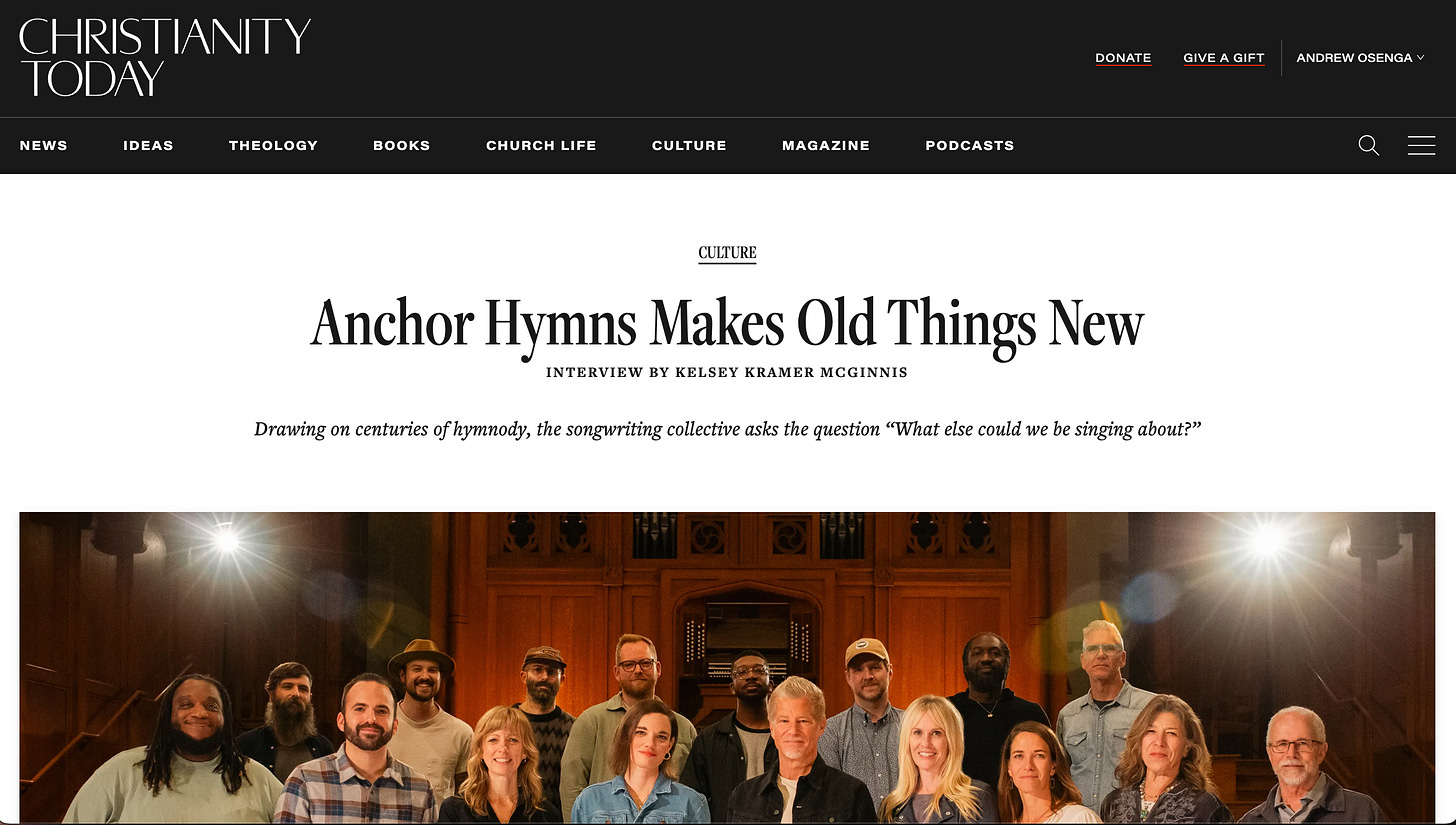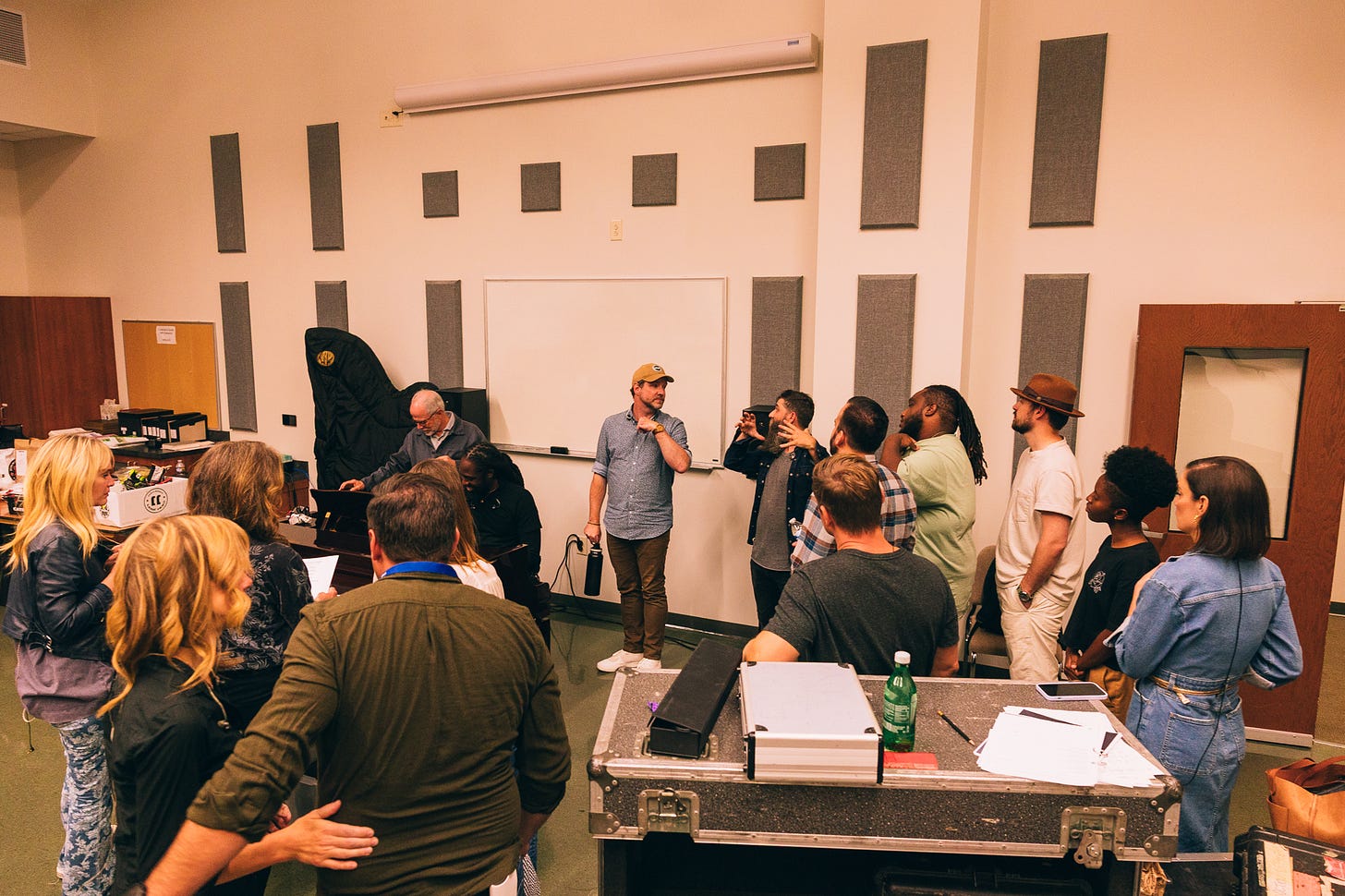Sandra, Sarah and I in Christianity Today TODAY.
Let's talk about hymns, baby, let's talk about you and me...
Hello friends! I’ve taken the past month or so off from writing on here and had set today as my return to Substack. Well, that new post is going to have to wait a few days now, because I want to share something else with you first.
About a year and a half ago, our little Anchor Hymns crew recorded a collection of songs during the Liturgy Collective conference, held at Covenant Presbyterian Church - the site of the tragic school shooting that claimed the lives of six people in our community earlier that year.
I’ll share more about that evening and that album here in a few weeks, but today I want to pass on this beautiful interview that appeared this morning on Christianity Today between Sandra McCracken, Sarah Kroger, me and CT music editor Kelsey Kramer McGinnis.
I loved that we got to tell the story of how Anchor Hymns began.
CT: Andrew, you led the formation of Anchor Hymns in 2022. What was the animating idea behind the project?
Andrew Osenga: When I look at older hymns, I see a wide variety of songs on different subjects and in a lot of different musical styles. When I think about a lot of the songs that we sing today, I think we tend to sing about three or four subjects. We have a very narrow vocabulary in the church.
We’ve been able to look at what churches have been singing for centuries and ask, “What else could we be singing about?” What about songs about grief or different kinds of joy? Songs about sacrificial love, loving your enemy, death, giving, or missions?
Sandra McCracken: Early on, in a meeting before we even had a name for the project, we talked about how a lot of people we knew were leaving the church. We were drawn to the idea of having songs that would not just outlast us but that would reach out and welcome people who may not want to be there now but might find themselves wanting to be there again. That was the hope.
This group of musicians is pretty ecumenical. We come from different backgrounds, and we’re not all going to vote the same way or agree on one set of theological statements, but there are things we can sing together, and we’re trying to find those.
Sarah Kroger: As one of the few Catholics in the group, I felt connected to this idea of new hymns because Catholics have a rich history of hymns in our own church. There are a lot of hymns that are specifically Catholic and others that fall into the Protestant category, and there’s not a lot of cross-pollinating. There are a few hymns that have crossed the barrier— “Be Thou My Vision,” “Come Thou Fount”—but I didn’t know “Great Is Thy Faithfulness” until I was an adult. And that is sad to me because it’s such a stunning song.
So for me, this project was an opportunity to cross-pollinate a little bit, to use these beautiful texts as inspiration and make something new that includes all of our voices and perspectives.
Kelsey, our interviewer, asked some fantastic questions about the deeper ideas that are driving the modern hymns movement Anchor Hymns is a part of.
CT: The past few years have brought what appears to be a surge in interest in hymns and hymnals. It seems there is a cycle in American evangelical culture of periodic returns to hymnody or more historically rooted worship practices. Why do you think hymnody—new or old—might be capturing the interest of some American Christians right now?
SK: I think the reason why I have been drawn to hymns more recently is because they connect me to this rich history of believers. I think about all the people who have sung these songs for centuries, some melodies literally since the beginning of the church.
To think about all of the people who have had joyful moments with these songs, wrestled with faith through these songs, and lifted these songs up in their own journeys—it is grounding and edifying for me to recognize that I’m a part of something bigger. And to add my voice to that history is really special.
SM: I think the disorientation of our time causes us to reach for things that are either nostalgic or connected to the past. And I think people want the sung theology of hymns; they are like sung gospel.
Hymns have a way of bringing us back to truth beyond just our own emotions. I think hymns do that more than some of the contemporary worship music that is more singularly emotive. Hymns tend to tell a wider story as you move through different verses that each have their own inflection.
AO: I don’t mean this in a cynical way, but I think that in a world where so many things feel like products, where we get our new songs from the radio or from a marketing email, there’s something about a song that we know existed before a marketing machine or a record company. There’s an inherent trust. We trust its motive in a different way.
I also think there’s a way that God speaks through melody and memory together, even beyond a lyric. These melodies have been passed down through generations. My grandfather had a very different theology than I do, but we believed in the same Jesus and are loved by the same Jesus. And I have these memories of him singing. There’s power in that.
Our conversation went for an hour and covered so much. Literally, each one of us had tears in our eyes at some point. It was really beautiful. I’m so thankful to Kelsey and Christianity Today for the opportunity, and I can’t believe they were able to edit it all down!
I’ll leave you with this quote, which I want to explore more in depth on here soon.
AO: I think everyone has their own idea of what a hymn is. For most laypeople, a hymn is an old-fashioned church song, and their idea of a hymn is different from the next person’s idea of a hymn because their “old-fashioned church” is different from the next person’s.
So I think some of what we really mean when we talk about singing hymns is standing together and hearing each other sing about God. It’s not like being at a concert; it’s hearing from our neighbors. It’s hearing from my dad, and my kid, and my third-grade teacher over there, and my neighbor, and the guy I don’t like, and the person I don’t know.
Sometimes they need to hear me, and sometimes I need to hear them. Sometimes I’m fully believing it, and sometimes I’m coming in asking them, “Please help me believe it.” Sometimes as I hear my friends sing it, I realize I needed to know that they believe it, because that helps me know that I believe it.
That’s what we’re talking about: carrying each other. It’s not necessarily even that we’re wanting an old-fashioned song. I think it’s that we’re wanting the experience of just being together and hearing one another, walking side by side.
You can read the entire article over on Christianity Today.
Our album “The Garden (Live)” comes out March 28.







I love this. I think there’s a yearning for all of us to remember where and who we’ve come from. We’re learning to desire a story that’s bigger than just our own 70+ years. It’s evident here!